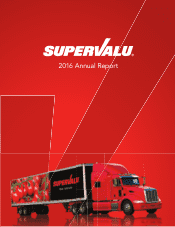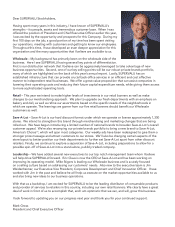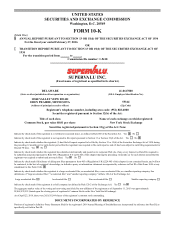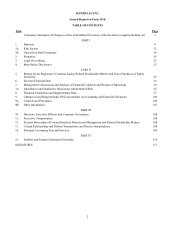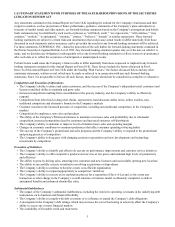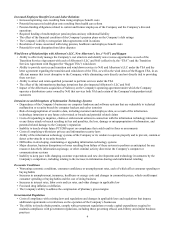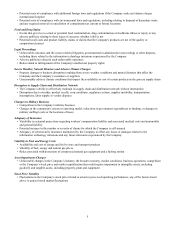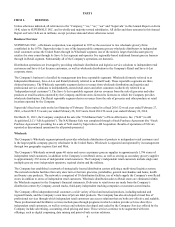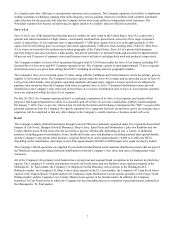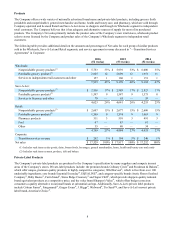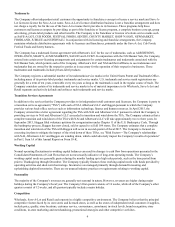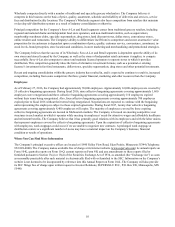Albertsons 2016 Annual Report Download - page 6
Download and view the complete annual report
Please find page 6 of the 2016 Albertsons annual report below. You can navigate through the pages in the report by either clicking on the pages listed below, or by using the keyword search tool below to find specific information within the annual report.4
Increased Employee Benefit Costs and Labor Relations
• Increased operating costs resulting from rising employee benefit costs
• Potential increases in health plan costs resulting from health care reform
• Pension funding obligations related to current and former employees of the Company and the Company’s divested
operations
• Required funding of multiemployer pension plans and any withdrawal liability
• The effect of the financial condition of the Company’s pension plans on the Company’s debt ratings
• The Company’s ability to renegotiate labor agreements with its unions
• Resolution of issues associated with rising pension, healthcare and employee benefit costs
• Potential for work disruption from labor disputes
Wind Down of Relationships with Albertson’s LLC, New Albertson’s, Inc. (“NAI”) and Haggen
• Ability to effectively manage the Company’s cost structure and identify new revenue opportunities as each of the
Transition Services Agreement with each of Albertson’s LLC and NAI (collectively, the “TSA”) and the Transition
Services Agreement with Haggen (the “Haggen TSA”) wind down
• Ability to provide services and transition and wind down services to NAI and Albertson’s LLC under the TSA and the
letter agreement regarding the transition and wind down of the TSA, as well as the wind down of the Haggen TSA, in an
efficient manner that is not disruptive to the Company, while eliminating costs directly and not directly tied to providing
these services
• Ability to attract and retain qualified personnel to perform services under the TSA
• The effect of the information technology intrusions that also impacted Albertson’s LLC and NAI
• Impact of the Albertson's acquisition of Safeway on the Company's operating agreement under which the Company
operates a distribution center owned by NAI that services both NAI and certain of the Company's independent retail
customers
Intrusions to and Disruptions of Information Technology Systems
• Dependence of the Company’s businesses on computer hardware and software systems that are vulnerable to technical
malfunction or security breach by computer hackers and cyber terrorists
• Risk of misappropriation of sensitive data, including customer and employee data, as a result of the information
technology intrusions or any future cyber-attack or breach and potential related claims
• Costs of responding to inquiries, claims or enforcement actions in connection with the information technology intrusions
or any future attack or breach resulting in fees and penalties, the loss, damage or misappropriation of information, and
potential related damage to the Company’s reputation
• Inability to timely obtain future PCI DSS report on compliance that could result in fines or assessments
• Costs of complying with stricter privacy and information security laws
• Ability of the information technology systems of the Company or its vendors to operate properly and to prevent, contain or
detect cyber-attacks or security breaches
• Difficulties in developing, maintaining or upgrading information technology systems
• Major disasters, business disruptions or losses resulting from failure of these systems to perform as anticipated for any
reason or data theft, information espionage, or other criminal activity directed at the Company’s computer or
communications systems
• Inability to keep pace with changing customer expectations and new developments and technology investments by the
Company’s competitors, including relating to the increase in information sharing and multichannel retailing
Economic Conditions
• Worsening economic conditions, consumer confidence or unemployment rates, each of which affect consumer spending or
buying habits
• Increases in unemployment, insurance, healthcare or energy costs and changes in commodity prices, which could impact
consumer spending or buying habits and the cost of doing business
• Increases in interest rates, labor costs and tax rates, and other changes in applicable law
• Food and drug inflation or deflation
• The Company's ability to address the compression of pharmacy gross margins
Governmental Regulation
• Costs of compliance with existing laws and regulations and changes in applicable laws and regulations that impose
additional requirements or restrictions on the operation of the Company’s businesses
• The ability to timely obtain permits, comply with government regulations or make capital expenditures required to
maintain compliance with government regulations, including those governing ethical, anti-bribery and similar business
practices

